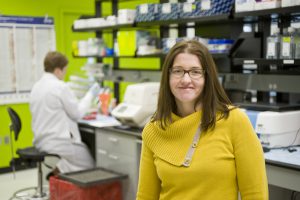
T-cell immunotherapy continues to take center stage as one of the most promising new cancer therapies of our time. After receiving the therapy, which reprograms a person’s own T cells to detect and destroy cancer, 93% of children with acute lymphoblastic leukemia (ALL) who enrolled in Seattle Children’s Pediatric Leukemia Adoptive Therapy (PLAT-02) trial and were unlikely to survive, achieved complete remission. Some are still in remission now more than two years out from the therapy.
This is a message that Dr. Rebecca Gardner, oncologist and lead investigator for the PLAT-02 trial at Seattle Children’s, will be underscoring in her abstract presentations at The American Society of Hematology (ASH) Annual Meeting. However, she will also highlight that there is still work to be done, and will present a possible answer to one of the most challenging puzzles facing researchers in the field: How can we limit the possible side effects of the treatment while retaining the effectiveness of the T cells?
“We are in a pivotal time where we know this therapy works in getting patients who are very sick into remission, but now we’re focusing on how to improve the treatment experience, which includes limiting the possible side effects,” said Gardner. “Our latest results mark an exciting milestone where we have potentially found the key to better controlling the body’s reaction to the T cells while still ensuring efficacy.”
Improving the cancer immunotherapy experience
After patients receive the infusion of their new and improved T cells, some can experience a side effect called Cytokine Release Syndrome (CRS), which commonly presents as a fever and fluctuations in blood pressure.
Until now, researchers have been hesitant to find a way to treat these side effects due to concerns with limiting the ability of the T cells to fight the cancer. However, Gardner will present results on Monday showing that researchers can intervene with two medications to decrease the severity of CRS without impacting efficacy or the persistence of the T cells.
In the middle of Phase 1 of PLAT-02, Gardner and her team began intervening when a patient had mild symptoms of CRS rather than waiting until their symptoms were more severe. They gave patients a medication called tocilizumab, which blocks some cytokine activity that can cause low blood pressure and fever, and dexamethasone, a steroid that calms the immune system. She found that adding the medications cut the rate of severe CRS in half, from 30% of the patients down to 15%. Better yet, the patient’s T cells were unaffected – they continued to grow each day and got patients into remission.
Based on these findings, the medications have now been added as a standard of care in the PLAT-02 trial for managing signs of mild CRS.
A focus on increasing T cell durability
In addition to focusing on improving the treatment experience, Gardner, Dr. Mike Jensen, the director of Ben Towne Center for Childhood Cancer Research at Seattle Children’s Research Institute, and their team are also working to increase the durability of the T cells to reduce the rate of relapse after therapy, which is about 50%.
For the patients that relapse, researchers have found that their reprogrammed T cells are no longer present or the cancer has evolved to circumvent the T cells. In exploring this further, Gardner can now identify which patients may be at a higher risk of losing their reprogrammed T cells, which could help uncover the answer to how to further improve this therapy.
“We now know that patients who have fewer cells that express CD19, the protein present on leukemia cells that the T cells are reprogrammed to attack, are at a higher risk of losing their reprogrammed T cells,” said Gardner. “This information allows us to work toward developing approaches to hopefully prevent relapse and we expect to open several new trials for patients in the next year.”
If you are interested in supporting the advancement of immunotherapy and cancer research at Seattle Children’s, please visit our donation page.
Resources:
- Seattle Children’s Cancer and Blood Disorders Center
- Doughnut Shop Tip in Texas Leads Family to Immunotherapy Cancer Trial, Zane Becomes Cancer-Free
- Seattle Children’s and Juno Therapeutics Accelerate T-Cell Immunotherapy Clinical Trials for Children and Adults With Deadly Brain Cancers
- Families Find Hope in Success of Cancer Immunotherapy
- From Hopeless to Cancer Free

